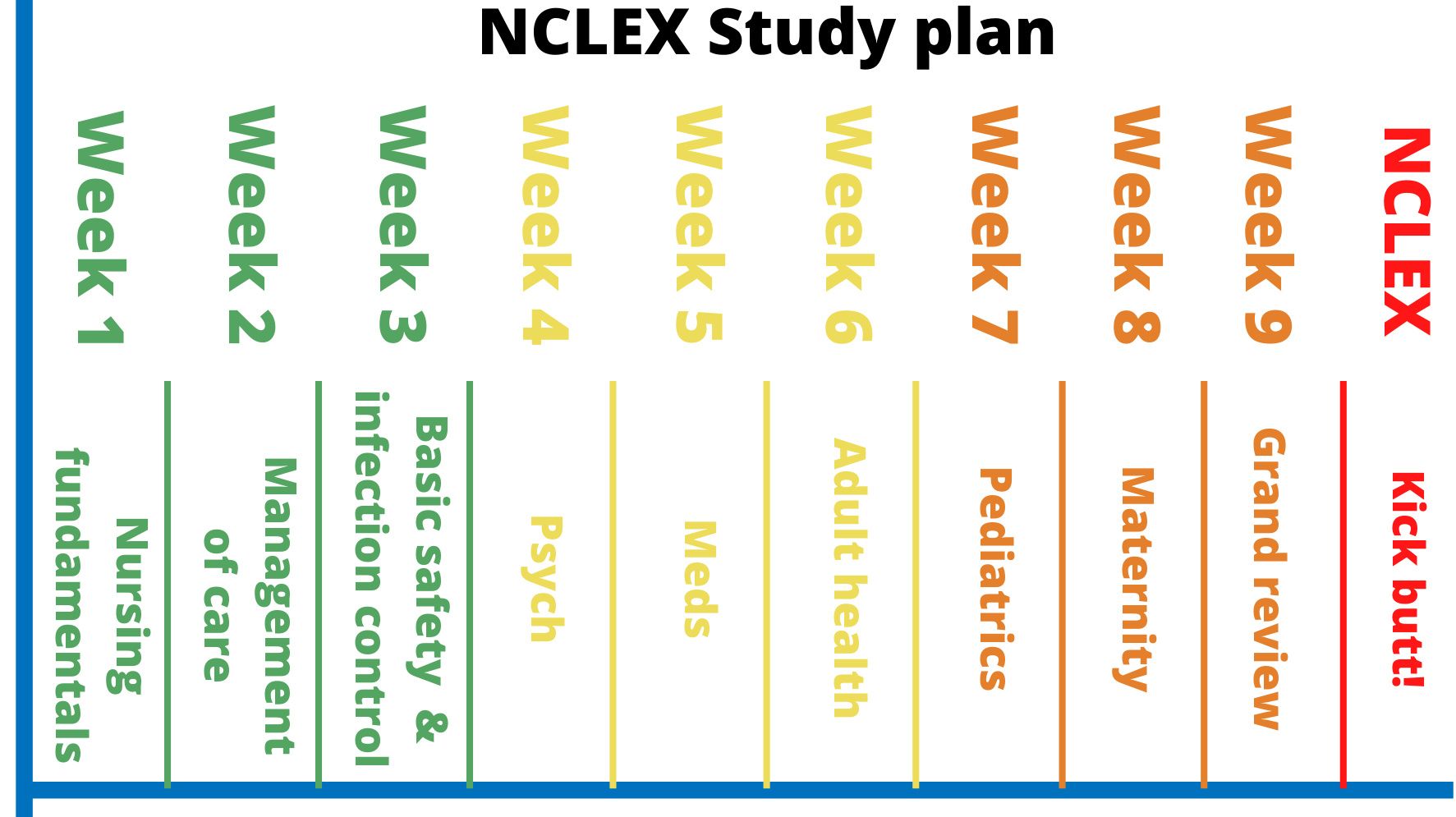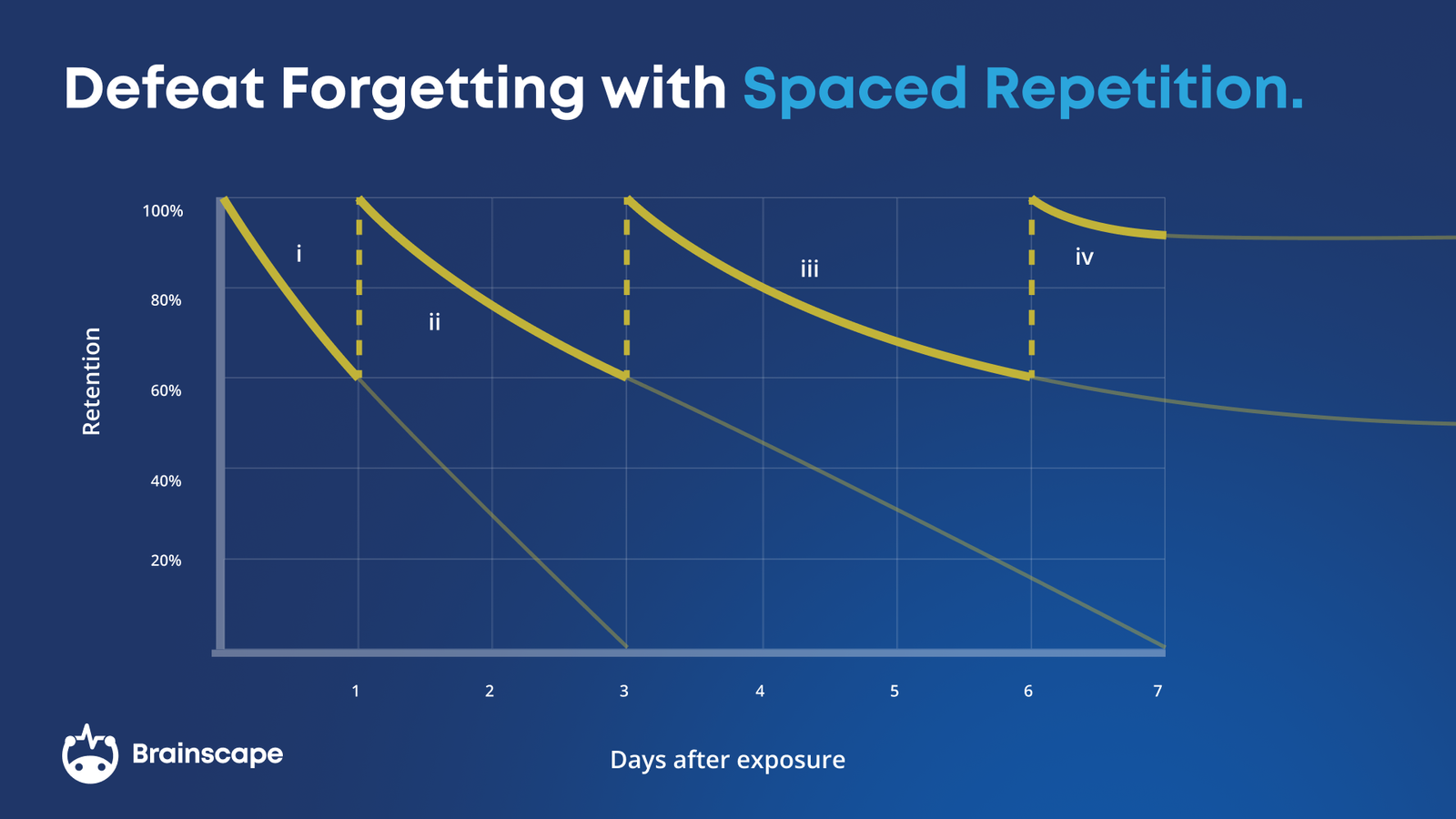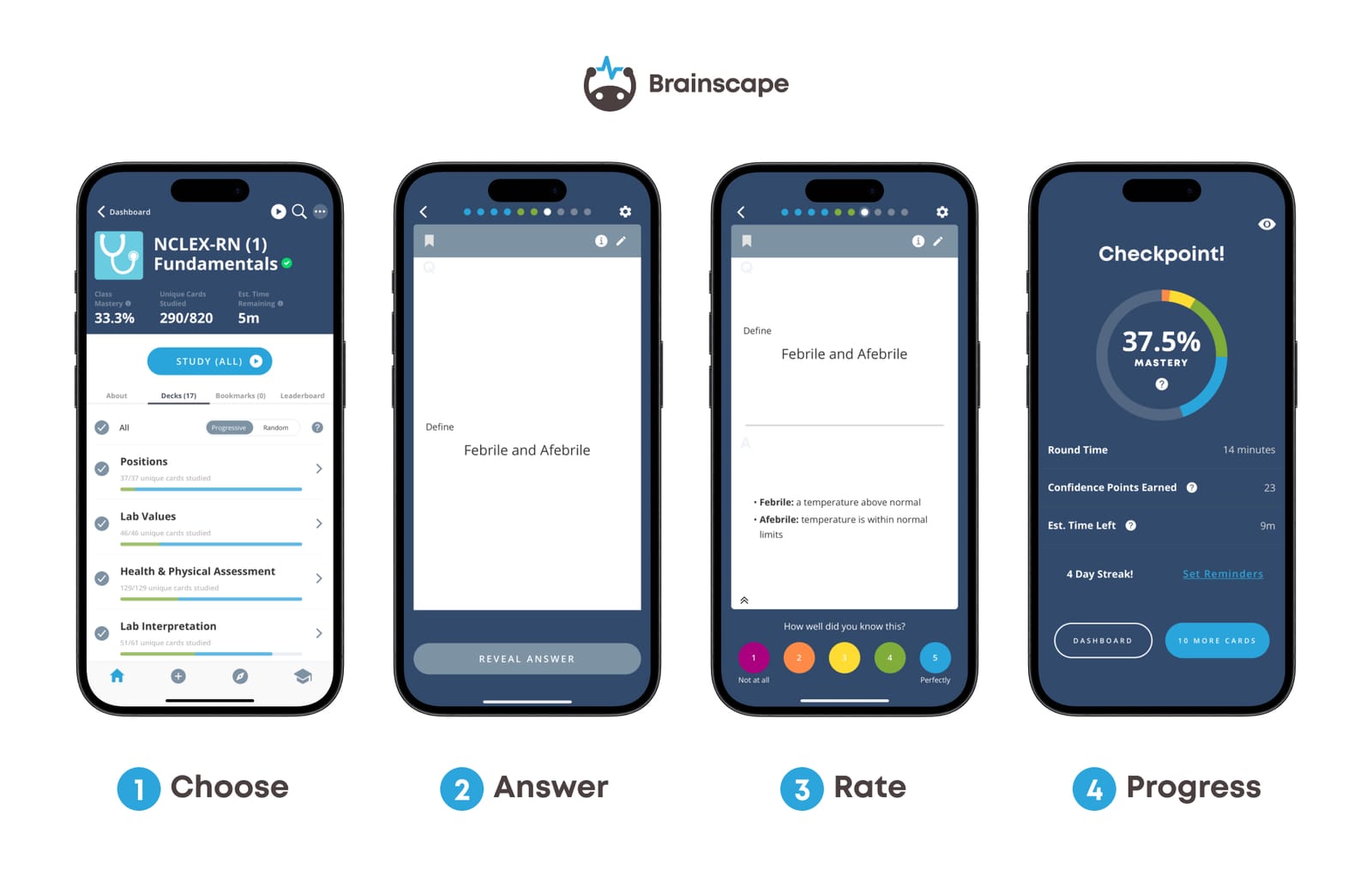It’s the start of your NCLEX study prep period, and you’re waking up every morning with a creeping sense of dread. You have nightmares about turning up to your exam with no pants on or—even worse—not knowing the answers to any of the questions!
It’s obvious what’s going on. You’ve got an acute case of NCLEX stress.
It happens to most students. The NCLEX tests an enormous body of knowledge. It’s also the gateway you need to pass through in order to pursue a career in nursing, so there’s a lot on the line.
To help you banish this anxiety, the team here at Brainscape joined forces with the legendary Justine Buick, The NCLEX Tutor. Justine is a Registered Nurse who herself has run the gauntlet of the NCLEX. She has almost a decade of experience in tutoring students and has taken just about every reputable NCLEX review course there is.
In short, Justine is the very best authority to turn to for advice on the NCLEX and, particularly, the stresses and anxieties that go along with it. So, in this guide, you’re going to learn how to remain calm and productive while you prepare for and take this challenging exam!
By the end of this NCLEX study guide, you'll have:
- An NCLEX study plan you can follow
- A strategy for test day
- Mental tools to evaporate stress and feel calm and in control
NCLEX Stress Reduction: It’s An External And Internal Game
The immutable law of exam stress is this: the very best way to conquer it is to KNOW YOUR STUFF. The reason students feel so stressed out in the period leading up to the NCLEX is because they’re afraid of failing. And they’re afraid of failing because they don’t believe they are adequately prepared.
So, the first challenge in NCLEX stress reduction is (1) winning the external game: mastering the course content and having a practical plan for exam day.
The second challenge is (2) winning the internal game, which is all about nurturing your mental health and using calming techniques and a healthy lifestyle to guide yourself through this time of great stress.
We’re going to deep dive BOTH right now, so roll up those sleeves and slap on those gloves! We’re gettin’ our hands dirty!

Managing NCLEX Stress: Winning The External Game
As Archilochus (poet and soldier of ancient Greece) said: “We don't rise to the level of our expectations, we fall to the level of our training.” So it’s time to make sure your training is so solid, your NCLEX stress will evaporate in the certainty of your readiness!
Follow the next steps, and you’ll be more prepared than 90% of the students who make their way into that examination venue.
Step 1: Put Together An NCLEX Study Plan

Let's face it, the NCLEX is a knowledge-intensive test. You must know the nursing content in order to pass. So the first step on your journey to conquering the NCLEX is to draft a study plan. Whether you’ve got 12 weeks or two weeks until the exam, having a plan in place will help you get through the necessary content by breaking it down into manageable daily goals.
How can you put together a study plan? It’s elementary, my dear, especially with our free NCLEX study planner templates: divide and conquer!
The NCLEX test is made up of eight sections:
- Management of Care (Coordinated Care for the NCLEX PN)
- Safety & Infection Control
- Health Promotion & Maintenance
- Psychosocial Integrity
- Basic Care & Comfort
- Pharmacological & Parenteral Therapies
- Reduction of Risk Potential
- Physiological Adaptation
If your review course doesn’t exactly follow these headings, you can lay out your NCLEX study plan according to the following:
- Nursing fundamentals
- Ethical/legal (management of care)
- Basic safety and infection control
- Psych
- Meds
- Adult health
- Pediatrics
- Maternity
So, let’s say you have nine weeks until you take the NCLEX. Divide the time you have left into nine portions. That’s one week for each of the eight NCLEX sections, and the week right before exam time for a monster review, which looks like this:

Whether you have nine weeks or three weeks before the exam, the concept is pretty much the same. But wait, there’s more ...
Each week, you should set aside about 20% of your time to review the sections you’ve already studied. The importance of regularly reviewing the material you’ve already covered cannot be emphasized enough because, without regular review, you will simply forget everything.
That’s right: it’s all your brain’s fault.
In science-speak, we call it the Ebbinghaus’s Forgetting Curve, which sounds like something straight out of a Harry Potter novel but, in fact, is the research of a muggle. Check out the diagram below ...

The Forgetting Curve demonstrates how new information vanishes from our brains over time ... unless we review that information again and again. Without review, it degrades rapidly, which we see in the above diagram. By day three, you will scarcely remember a thing about what you studied, which will send you into the NCLEX incredibly nervous.
If, however, you review the content again the next day, you’ll reinforce what you’ve learned, thereby creating a stronger memory, although it will still degrade a little over time. Review again on day 3 and day 4, and that memory will become an increasingly permanent part of your memory bank. The more you review, the more you internalize the facts you need to remember to ace the NCLEX.
This is what is referred to as spaced repetition, and it is precisely how the human brain is hard-wired to master new information quickly. Traditional studying techniques sorely neglect to leverage the power of spaced repetition, but there is one nifty tool that’s all about it: flashcards.
Flashcard apps like Brainscape or Quizlet use spaced repetition to help you learn up to twice as fast, with an intelligent algorithm that feeds you material at the perfect rate to keep you learning at maximum capacity. It then repeats material just often enough to keep it in your working memory.

Bonus: because these apps are on your phone, you can take your flashcards with you anywhere and sneak in study sessions, anytime.
Step 2: Devote Yourself Daily To Achieving Your NCLEX Study Goals
Right, so you have a plan and you have the tools. Now you’ve got to do it!
There comes a time in everyone’s life when they need to saddle up and get on with the work. You can’t become a nurse without passing the NCLEX, and you can’t pass the NCLEX without achieving those daily study goals you set out for yourself in Step 1.
Remember, these smaller goals are intended to keep you razor-focused and your mind off the big-picture anxieties of taking the NCLEX. If, however, you do become overwhelmed, remind yourself: I don’t have to worry about the NCLEX today because I’m not taking it today. All I have to think about is this chapter on, for example, pediatrics.
Step 3: Regularly Practice NCLEX Questions
As we said before, the best remedy for stress is knowing that you’ve got what it takes to succeed. And the best way to know this is to prove it to yourself experientially.
You can do this by doing NCLEX practice questions. Leading up to the NCLEX, you’ll want to make practice questions a part of your daily routine; ideally, around 50 to 75 practice questions per day.
Step 4: Have A Strategy For The NCLEX Test Day
You’ve come this far. You’ve done all the hard work. Now, the very last thing you want to happen is something stupid that compromises your exam: like getting lost on the way to the exam venue, or not showing up with the necessary documentation, or enough water to see you through.
This is where practical preparation comes in and is key.
Pearson Vue runs the NCLEX test centers. As soon as you have your NCLEX date and test center location, plan it like an operation. If you have to travel to take the test, book accommodation far in advance, close to the test venue.
Determine whether you’ll be driving there (in which case you’ll need to organize parking) or whether you’ll be taking public transport or a taxi. Plan your timing with a ton of elbow room, accommodating for every conceivable hitch or delay, and aim to get to the venue at least thirty minutes before your test.
Here are some other considerations, according to Justine Buick:
- Wear comfortable, layered clothing on test day. That way if the test room’s too cold, you’ll be fine, and if it’s too hot, you can peel off a layer.
- Bring adequate hydration with you: the NCLEX is a maximum of five hours long so you should plan as though you’re going to be there for that long.
- Bring slow release energy snacks to keep your brain firing (again, because the exam could take you five hours to complete).
With all of this said and done—your study plan, your daily devotion to studying and practicing questions, and test day logistics sorted—you will have won the NCLEX’s external game. And you should find an enormous amount of NCLEX stress and anxiety lifted off your shoulders.
The next step is turning our focus inwards to tackle the internal game of managing your NCLEX stress. Let’s do that right now …
NCLEX Stress Management: Winning The Internal Game
Even when you’re as prepared as a scout at summer camp, there’s still the internal head game to win. And as wonderful as our brains are at solving problems, they’re also remarkably talented at cooking up all kinds of doomsday scenarios, which can cause anxiety.
We’re now going to look at some tools you can use to remain calm and focused, leading up to and during the NCLEX:
- Exercise (and sleep)
- Breathing, meditation, and relaxation techniques
- Talk to someone
- What’s the worst thing that can happen?
Tool 1: Exercise (And Sleep) For NCLEX Stress Management
You’ve heard it before, no doubt, and as a nursing student, you should be well aware of the importance of proper sleep to whole-body health and memory function.
Aside from improved energy, getting quality sleep increases your brain’s ability to retain knowledge, so your studying will pay much greater dividends than if you slog through the NCLEX content half dead.
Now you just need to create the space in your schedule for sleep, giving it priority over late-night cramming (which doesn’t work anyway). The only problem is, your NCLEX stress can keep you up at night.
The solution? Exercise!
Exercise is a fantastic natural sedative, amongst its many other health benefits. It also releases endorphins, which are a great panacea for stress and anxiety.
Tool 2: Breathing, Meditation, And Relaxation Techniques

As a nurse in training, you’ll know all about the difference between diaphragmatic and stress breathing. The ability to control your breathing is something that will not only help you to banish NCLEX stress right now, it’ll also be a great benefit to you throughout your nursing career.
So spend some time practicing diaphragm breathing. There are apps that can help you with this. Notice when you switch into stress breathing mode and take a few seconds to switch out of it and back into diaphragm breathing. This can be a game-changer when it comes to good test-taking technique.
Also, take the time to relax or indulge in a little guided meditation. Simply lying down for five minutes and listening to one of their guided meditations can do a great deal to alleviate stress.
Tool 3: Talk To Someone
Talking to a friend, family member, or colleague can do wonders for relieving that built-up NCLEX stress in you. Oftentimes, it’s in putting our feelings “out there” that we gain the perspective we need to realize that, hey, I’m actually on the right track to success here!
The person you speak to can also help to adjust your expectations and provide some more objective feedback on your progress, which can feel calming. Our only caution here is not to share your stress with another mid-meltdown NCLEX student because that will just add fuel to the fire.
Tool 4: What’s The Worst Thing That Can Happen?
“Named must your fear be, before banish it you can.” — Yoda
It may seem contrarian, but one powerful way to banish NCLEX stress is to think negatively, at least for a short amount of time.
This is because a lot of stress and anxiety come from unformed, undefined fears. In essence, we worry that we won’t be able to cope with a situation if it does arrive. But we’ve never clearly thought out what that situation might be. This leaves the door wide open to a nebulous cloud of free-floating anxiety, which can be very draining.
But when you really go there and clearly picture your worst-case scenarios, two surprising things happen:
Firstly, you take your fears out of the vague, free-floating state and make them a defined thing you can look at objectively. This immediately makes them lose a lot of their power.
Secondly, you can come up with contingency plans if these worst-case scenarios do occur. This further defuses their power. Most fears, when pulled out and examined fully, are not as terrible as their shadows.
For example, if the worst-case scenario you can imagine is failing the NCLEX, look this scenario squarely in the eye. Would it be fatal? No. Would your nursing career end up in the bin? No. Will you survive and go on to be a great nurse? YES, if you persevere!
In fact, you could retake the exam in about 45 days.
So, confront your NCLEX stress. Go somewhere quiet with a pen and paper and write out all your anxieties. Ask yourself how quickly you’d recover if they happened, and craft a plan to prevent them from happening or deal with the fallout should they happen. With a plan in place, you should feel much lighter.
Managing NCLEX Stress: A Final Word
The NCLEX is not only a great test of your nursing knowledge; it’s also a great test of your ability to cope with stress, which will become essential for you in the healthcare environment.
Stress reduction techniques, calming apps, and guided meditations are useful tools for helping you with the day-to-day task of managing your NCLEX stress. But ultimately, nothing compares with knowing your stuff and being prepared.
Stress vanishes when you know you’re equipped to cope with the challenges ahead. And you can know this when you make a plan, follow it, and test your knowledge and skills (the right way) long before you’re due to take the NCLEX.
So:
- Make your NCLEX study plan
- Devote yourself to achieving your daily study goals
- Reinforce your knowledge with digital flashcards
- Practice NCLEX exam questions daily
- Consistently review the material you’ve learned before so you don’t forget
- Get good sleep and exercise
- Remember to breathe from your diaphragm
- Talk to someone if you’re struggling
- Confront your fears to see them for what they really are
And remember: you’ve got this.
**NCLEX-RN® is a registered trademark of the National Council of State Boards of Nursing (NCSBN), which neither sponsors nor endorses this product.
Additional Reading
- How to study medications for the NCLEX
- The best way to use NCLEX practice questions
- Does it matter which nursing school you attend?
References
Ebbinghaus, H. (1913). Memory: A contribution to experimental psychology. New York: Teachers College, Columbia University.
Home. NCLEX. (n.d.-a). https://www.nclex.com/
Karpicke, J. D. (2012). Retrieval-based learning: Active retrieval promotes meaningful learning. Current Directions in Psychological Science, 21(3), 157-163.
Ma, X., Yue, Z.-Q., Gong, Z.-Q., Zhang, H., Duan, N.-Y., Shi, Y.-T., Wei, G.-X., & Li, Y.-F. (2017). The effect of diaphragmatic breathing on attention, negative affect and stress in healthy adults. Frontiers in Psychology, 8. https://doi.org/10.3389/fpsyg.2017.00874
The NCLEX Tutor. (2025, March 20). https://thenclextutor.com/
